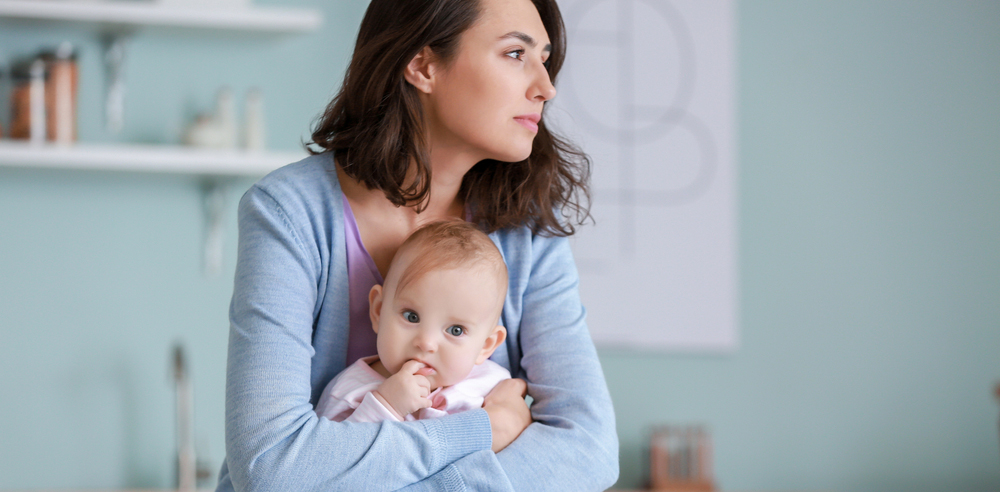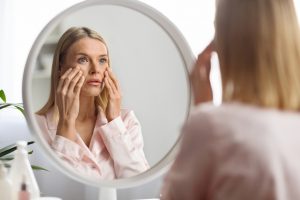“Love Island star Montana Brown recently shared her struggles with post-partum hair loss, asking for advice on how to help some ‘bald patches’ to regrow.
“This is a very normal post-partum side-effect, as over 90 percent of women experience hair loss after giving birth.
“Here’s a little more information about post-partum hair loss, including how long it lasts, when it’s likely to start and stop and tips to manage it…
What is postpartum hair loss and how long will it last?
“During pregnancy, large volumes of oestrogen and progesterone flood the system as part of the body’s natural response.
“This surge in hormones sustains the pregnancy but after birth, there is a sudden drop in oestrogen resulting in sudden and excessive hair loss at around, known as postpartum alopecia, which has been found to occur around two to five months after.
“Even though this can be alarming and stressful, it is important to not be anxious. The good news is that it is temporary and before long you will be back to normal – as it generally only lasts between six to 24 weeks after it begins.
Is post-partum hair loss preventable and manageable?

“Unfortunately, research suggests that there is no definitive way to prevent or treat postpartum hair loss. Any investigative studies on the matter have limitations, including unrepresentative sample sizes, absence of a control group and a lack in subjective measurement of a treatment response.
“However, non-drug treatments used for related hair loss problems are recommended and there are a number of practical ways to ensure that you’re not making the hair loss worse.
“Here’s a few tips to help combat the issue:
Be gentle on your hair
“Try and limit your use of heat styling tools such as straighteners or hairdryers.
“If you’re someone who dyes their hair regularly, give your hair a break from harsh chemicals as they can reduce melanin and destroy the hair follicles, leading them to thin or fall out even further.
Chop it
“Now that you’re a mum, this could be your time to try a shorter hairstyle. As many mums already know, babies love to pull and tug on your already fragile postpartum hair.
“Not only does shortening your hair add thickness and reduce weight, cropped hairstyles also hide the appearance of sparse areas. Most importantly, losing the length will protect your tresses from any pulling from your little one.
“If you’re used to longer locks, consider investing in clip-in hair extensions to add length and volume on special occasions.
“So, why not use this excuse to treat yourself to a trip to the salon and enjoy some you time on the weekend while your partner babysits the new addition.
Nourish from within

“After birth, it is so important to make sure you’re getting enough nutrients, with many mums opting to take supplements – especially if breastfeeding. Not only is this important for your body and ability to nourish your baby, but poor nutrition could also contribute to further hair loss.
“A lack of minerals like iron, selenium, and zinc are commonly associated with hair loss, as they’re needed for natural sunlight defence and getting a strong oxygen supply to the follicles and hair cells.
“To ensure maximum hair health and prevent hair loss, ensure you consume plenty of protein and iron-rich foods such as red meat, spinach and pumpkin seeds. Hair follicles are mostly made up of a protein called keratin so, when an adequate amount of protein is consumed, the hair produces higher levels of keratin, enabling the hair to repair and grow. In addition, by consuming biotin-rich foods such as organ meats, egg yolk, nuts, bananas, cauliflower and mushrooms – you can improve your body’s keratin infrastructure.
“Similarly, ensure you’re eating foods rich in Omega-3 and Vitamins A, C, & E. Omega-3 – found in fish oil – provides essential proteins and nutrients to hair follicles, prevents follicle inflammation and promotes scalp circulation. Vitamin A – found in foods such as sweet potatoes, carrots, milk, eggs and yogurt – is a necessity for hair cell growth and is needed to allow hair to stay moisturised. Vitamin C – found in strawberries, peppers, guavas and citrus fruits – is needed to make collagen, prevent hair from aging and helps the body absorb iron. And Vitamin E – found in sunflower seeds, almonds, spinach and avocados – is an antioxidant which can help prevent oxidative stress and boost hair growth.
“You might also look to boost any postpartum oestrogen loss with foods such as flaxseed, soy products or garlic.
Try squeeze in some light exercise

“While it may not be possible to fit in long gym sessions, going for long strolls with your baby in the pram is a perfect way to aid hair loss and growth.
“That’s because when exercising, your blood flow and circulation increase, resulting in more nutrients and oxygen reaching your scalp, which hair needs to grow.
“Plus, that extra boost of serotonin is good for your mental health, especially postpartum.
Be kind to yourself
“Lastly, becoming a mum is known to be one of the most stressful (and beautiful) times of a women’s life. But stress is a known inducer of hair loss.
“Try to remember that whilst your baby needs all the care in the world – so do you. High stress levels, combined with a sudden change in hormones, can result in telogen effluvium – a form of hair loss characterised by hair thinning and an increase in hair shedding triggered by a shock to the system that induces stress.
“Consider incorporating slow-paced activities such as reading a book, going for a walk, or practising yoga and meditation.”





